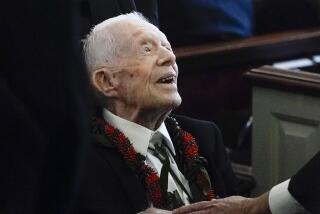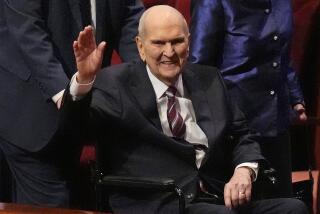PERSPECTIVES ON CAMPAIGN ’96 : Is Dole Too Old to Be President?
- Share via
Republican presidential candidate-to-be Bob Dole appears fit and eager to serve four or perhaps eight years as president. Medical reports that he released indicate that for a man of 72, he is in good health.
“For a man of 72”--that is the sticking point. Is age an issue in the 1996 race? Should it be?
Should Dole win in November, he would be the oldest U.S. president taking office for the first time; he would be 3 1/2 years older than Ronald Reagan was at the beginning of his presidency.
Is it legitimate to raise the age issue, or would that be an example of politically incorrect ageism? Dole has, in effect, already raised it himself, running in the primaries as “the comeback adult” in contrast to Bill Clinton’s 1992 comeback kid image.
As sensitive as this issue may seem, there is ample reason to get it out in the open. After all, we are electing someone to what is commonly referred to as the most powerful position in the world. In a democracy, we the people need all the information we can gather in order to make an informed judgment about who will lead us.
What have we seen in Dole the senator and Dole the primary candidate that tells us of his ability to handle the demands of the presidency?
If history is to be our guide, there is reason to pause. We know a great deal about aging, and we know a great deal about aging and leadership.
Leaders face an especially rocky road where aging is concerned. As Jerrold M. Post and Robert S. Robins note in their book, “When Illness Strikes the Leader” (1993): “Not only are leaders prey to the illnesses that afflict us all, but for some the pressures of high office exact a special toll.” Even excluding those who were assassinated, American presidents “have had a substantially lower life expectancy than their fellow citizens of the same age.”
And as John Moses and Wilbur Cross write in “Presidential Courage” (1980): “Paradoxically, this congregation of human beings who have been voted into the nation’s highest post has a history of disease, dementia, and disability--not to mention violence--higher in proportion than that of almost any other professional body on record.”
Their chilling conclusion: “From a purely statistical viewpoint, the chances are overwhelming that in the ranks of the next 10 presidents, two will suffer heart attacks; one will be hit by a disabling cerebrovascular accident; one will require surgery, radiation or chemotherapy for cancer; one will suffer a critical accident; one will develop serious emotional problems that will be partially or totally disabling; and several will require radical general surgery. This sobering medical profile does not take into account the statistic that one out of every 10 presidents is assassinated.”
Being president is a taxing, stressful, physically grueling job. Ample recent research points to a link between stress and illness. Is there a more stressful job than president? Robert Gilbert notes in his book, “The Mortal Presidency” (1992) that two-thirds of our presidents died before reaching their life-expectancy. This in spite of generally being wealthier and having access to better medical care than most citizens. In short, the job of being president is dangerous to one’s health, political and otherwise.
And the effects of presidential illness--physical or mental--can be devastating, from emboldening adversaries to sending the stock market into a plunge.
History is replete with examples of aging leaders falling ill. Most recently, we’ve seen French President Francois Mitterrand’s long, secret bout with prostate cancer, and Greek Prime Minister Andreas Papandreou’s two months on life support last winter. And we remember the questions of Ronald Reagan’s judgment toward the end of his presidency, when the early stages of Alzheimer’s disease began to show.
Given the potential for a president’s age and illness to affect the nation, it is perfectly legitimate, even necessary that we confront these questions openly. (If Bill Clinton can be asked on national television if he ever had an extramarital affair, questions concerning Bob Dole’s age seem mild by comparison.)
The office of president is too important for the U.S. and the world to allow what some may think is a question of tact or courtesy to interfere with the public getting information essential to making a reasoned decision. If we don’t face the age issue now, we may be forced to face it when it may be too late.
More to Read
Get the L.A. Times Politics newsletter
Deeply reported insights into legislation, politics and policy from Sacramento, Washington and beyond. In your inbox three times per week.
You may occasionally receive promotional content from the Los Angeles Times.










